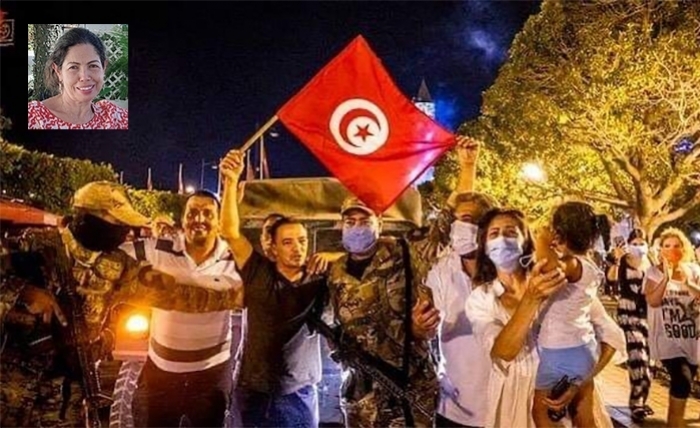Open Letter to the Representatives of the International Community : The progress of Tunisia towards democracy has been derailed and needs a fundamental reset

Rakia Moalla-Fetini, a Tunisien national - In light of the misleading narrative that Western media continue to peddle about the victory of democracy in the wake of the “Arab spring” in Tunisia, I am addressing to you this letter to challenge this narrative and help promote wiser policies that would better serve not only the Tunisian people but people everywhere in what has become a global village. I argue that the beginning of a solution to the current crisis could only come from outside the legitimacy of an opportunistic and ill-advised system adopted in the chaos that followed the popular uprising in 2011.
Lire la version en langue française
At first glance, concerns expressed by Western media about the latest developments in Tunisia are easy to understand. A president who fires the prime minister and suspends parliament – invoking an article of the constitution that allows him to do so only with their consent – does indeed sound alarming. From a distance, it looks like a return to autocracy and the nipping of the much-touted Tunisian democracy in its bud. But things look quite differently from the vantage point of the majority of the Tunisian people. For them, the so-called Arab spring—ushered in by the fall of the regime of President Ben Ali in 2011—has turned into a long, harsh winter of economic hardship, and social and cultural decline.
Unlike Western democracies which have had centuries to form multi-party-political systems, Tunisia was governed by a single party from the time it gained independence in 1956 until Ben Ali was ousted. A myriad of tiny parties came and went, but never achieved any real weight, except the Movement of Islamic Tendency— which was formed in 1981 and outlawed ten years later as a faction whose aims were essentially theocratic. Therefore, the collapse of Ben Ali’s government created a vast vacuum. Within a fortnight it was filled when the leaders of the Islamic Movement returned from exile and formed the Ennahda party. In the chaos and confusion, they swiftly outlawed the former ruling party—the only party that could have mounted a real challenge to them—and were then able to win a plurality in a constituent assembly. They leveraged this to write a new constitution abolishing the presidential regime and replacing it with a parliamentary system. This move proved to be decisive and disastrous. In their anger against the abuses under the regime of President Ben Ali, the Tunisian people welcomed this move, throwing the baby out with the bathwater.
Since the adoption of the new constitution in 2014, the country has been governed by short-lived, weak and unstable coalition governments formed by Ennahda and a coterie of small parties born of the last minute. They lacked a unified vision and a credible program to propel the country on a higher growth path. Instead, the nepotism, corruption, mismanagement, and sheer incompetence demonstrated by Ennahda and its coalition partners have had devastating effects on the economy: the 4-5 percent growth of the previous decade faltered to 1-2 percent; the endemic structural deficit in job creation worsened, living standards (as measured by per-capita income in current US$) fell by some 20 percent, and the large budget and trade deficits which were mainly financed by foreign borrowing led to a doubling of the external debt to nearly 100 percent of GDP. There is now a serious risk that the country has no other option but to go to the Paris club to ask for a restructuring of its debt.
Equally damaging, the country which used to enjoy great security and prided itself on its tolerance and open-mindedness is witnessing a spread of Muslim fundamentalist ideology and terrorist acts. The third largest contingent of ISIS fighters in Syria were Tunisian nationals. Many of them have returned to Tunisia and their reinsertion into society without trial presents a major security risk. Several of the recent gruesome terrorist attacks in Europe have been perpetrated by Tunisian nationals. The perpetrators of multiple terrorist attacks on Tunisian soil have yet to be prosecuted.
By providing large multilateral and bilateral loans, the international community bankrolled what it thought was an experiment in building democracy. In fact, all it did was to mortgage the future of the next generation of Tunisians to enable fiscal profligacy and political delinquency. It persisted in doing so despite the uninterrupted downgrading of the country’s credit ratings. Since 2011, Moody has steadily downgraded Tunisia from Baa2 in 2010 to B3, as of now, with parallel moves by Fitch.
The international community would be wise to recognize that Tunisia’s progress towards democracy has been largely derailed and so should stop championing the new constitution and the weak institutions emanating from it. The beginning of a solution could only come from outside the legitimacy of an opportunistic and ill-advised system adopted in the chaos that followed 2011. Tunisia should return to a presidential regime, that takes into consideration its current stage of political and economic development. The executive branch of government should be in the hands of a president solely accountable for implementing a strategy to return public finances to solvency and boost the capacity of the economy to create jobs that offer a dignified life to its citizens. With reinforced institutions of checks and balances of democratic governance, a presidential regime is the best bet for Tunisia going forward.
R.M-F
Lire la version en langue française
(Traduction : Mohamed Bouriga)